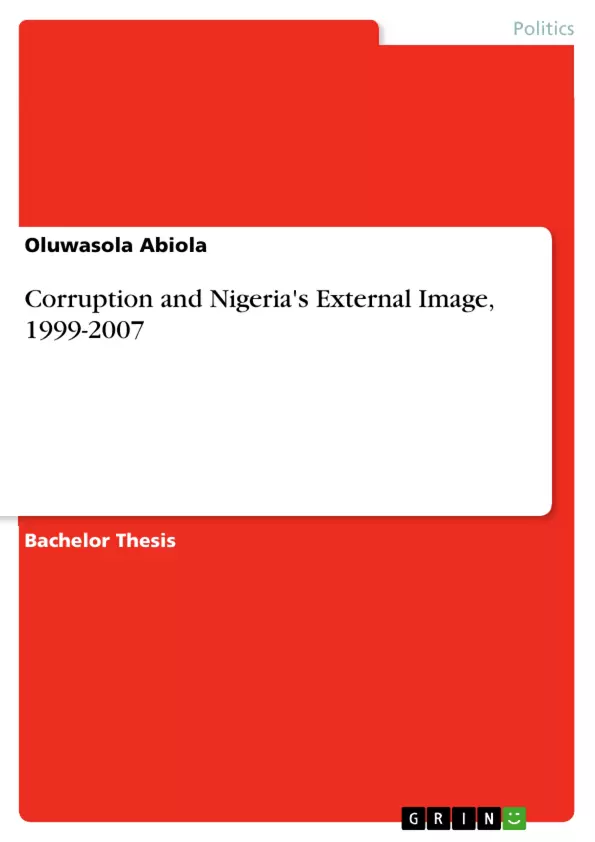In Nigeria, corruption is one of the many unresolved problems that have robbed the nation of development. It remains a long-term major political and economic challenge for Nigeria. According to Alabi and Fashagba, Nigeria's search for enduring socio-economic, political and technological development as well as efficient and productive utilization of allocated have been undermined by pervasive corrupt practices in the polity.
One cannot talk about Nigeria and neglect the reality of corruption in the country, and this is why the administration of Olusegun Obasanjo (1999 and 2007) gained unprecedented global attention on account of its unenviable record of corruption, especially in the political circles of the country. This is not to suggest that corruption in the country started with the Obasanjo administration in 1999, rather it is to emphasize how intensified corruption cases have been since the beginning of the Fourth Republic. The level of corruption in the country is very high, and its effects on the external image of the country is nothing closed to positive. The Nigerian state is a state dominated by the forces of corruption, especially the corrupt elites who has turned the resources of the Nigerian state into what is now popularly referred to as the “national cake” which they share as they like among themselves at the detriment of the masses, this further confirms the words of Ogbewere that corruption is a clog in the wheel of progress in Nigeria and has incessantly frustrated the realization of noble national goals, despite the enormous natural and human resources in Nigeria.
The political elites ever since independence of the Nigerian state have not stopped to enrich their own personal pockets with the country’s luxuries while hiding under the façade of fighting corruption in their respective political offices.
This further explains why the Nigerian elites have so much interest in the political affairs of the state and in some way have turned it into a business venture rather than a serving avenue. The much reason Remi Chukwudi Okeke and Adeline Nnenna Idike made it known that indeed, in very simple and clear terms, the monumental enumerations indict the Nigerian elite in its generic connotations. It typifies the scenario of elites establishing an inverse relationship between the institutionalization of a state and its usefulness.
Inhaltsverzeichnis (Table of Contents)
- CHAPTER ONE: INTRODUCTION..
- CHAPTER TWO: FRAMEWORK FOR ANALYSIS..
- CHAPTER THREE: CONCEPTUALISING CORRUPTION AND EXTERNAL IMAGE.
- CHAPTER FOUR: CORRUPTION AND NIGERIA'S EXTERNAL IMAGE, 1999-2007.
Zielsetzung und Themenschwerpunkte (Objectives and Key Themes)
This study aims to examine the impact of corruption on Nigeria's external image during the period 1999-2007. The work explores the relationship between these two concepts, analyzing the factors that contribute to corruption and its consequences for Nigeria's global reputation.
- The role of corruption in shaping perceptions of Nigeria internationally
- The effects of corruption on foreign investment and economic development in Nigeria
- The impact of corruption on Nigeria's political stability and security
- The strategies employed by the Nigerian government to combat corruption
- The role of international organizations in addressing corruption in Nigeria
Zusammenfassung der Kapitel (Chapter Summaries)
- CHAPTER ONE: INTRODUCTION: This chapter provides a comprehensive overview of the study's background, objectives, and research methodology. It also defines the scope of the study and sets out the key research questions to be addressed.
- CHAPTER TWO: FRAMEWORK FOR ANALYSIS: This chapter develops a theoretical framework for analyzing the relationship between corruption and Nigeria's external image. It draws on relevant theories from international relations, political science, and development studies to provide a conceptual foundation for the research.
- CHAPTER THREE: CONCEPTUALISING CORRUPTION AND EXTERNAL IMAGE: This chapter examines the concepts of corruption and external image in detail, exploring their different forms, causes, and consequences. It also discusses the various approaches to measuring corruption and assessing its impact on a country's international reputation.
- CHAPTER FOUR: CORRUPTION AND NIGERIA'S EXTERNAL IMAGE, 1999-2007: This chapter examines the specific case of Nigeria, analyzing the nature and extent of corruption during the period 1999-2007. It also investigates the consequences of corruption for Nigeria's foreign relations, economic development, and security.
Schlüsselwörter (Keywords)
Corruption, external image, Nigeria, international relations, foreign investment, economic development, political stability, security, Transparency International, Economic and Financial Crime Commission (EFCC), Independent Corrupt Practices and other related offence Commission (ICPC).
Frequently Asked Questions
How did corruption affect Nigeria's image between 1999 and 2007?
Corruption during the Obasanjo administration significantly tarnished Nigeria's global reputation, leading to negative perceptions from foreign investors and international organizations.
What is the "national cake" concept in Nigerian politics?
It refers to the perception among corrupt elites that state resources are a wealth to be shared among themselves rather than used for public development.
What anti-corruption bodies were active during this period?
The Economic and Financial Crimes Commission (EFCC) and the Independent Corrupt Practices Commission (ICPC) were key institutions established to tackle the problem.
Why did Nigerian elites turn politics into a "business venture"?
The study argues that elites institutionalized corruption to enrich themselves personally, creating an inverse relationship between state utility and private gain.
What was the role of Transparency International in Nigeria's image?
Transparency International's rankings often placed Nigeria among the most corrupt nations, which directly influenced the external image and foreign policy challenges.
- Arbeit zitieren
- Oluwasola Abiola (Autor:in), 2019, Corruption and Nigeria's External Image, 1999-2007, München, GRIN Verlag, https://www.grin.com/document/536791



